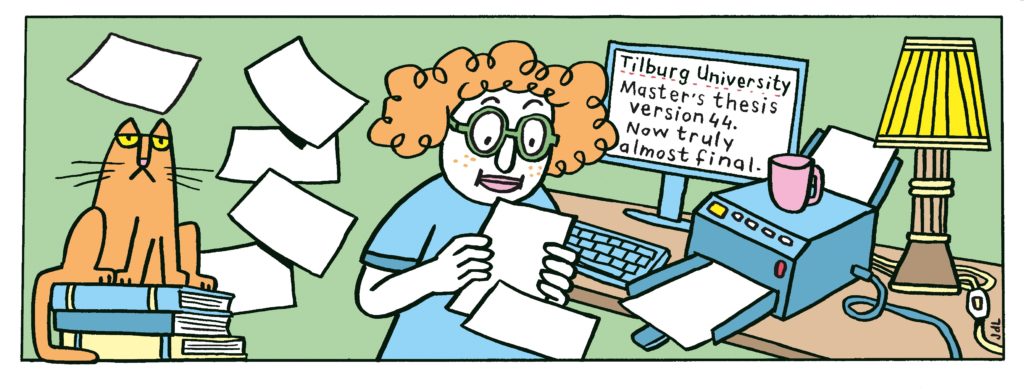Ilana Buijssen: ‘What do metaphors teach us about depression?’
A literature review, experimenting in the lab, or working with SPSS? Tilburg University students write the most diverse theses. In the section Master’s Thesis, Univers highlights one every month. This time: five questions to Ilana Buijssen. She studied philosophy and wrote a thesis on metaphors used to describe depression.

Where did the inspiration for your thesis topic come from?
“First of all, out of a personal interest. A number of people around me have had depression themselves. That fascinated me in a way. They experienced something so intensely nasty. I wanted to understand what they went through. Reading up on a subject helps to get a better picture. For example, I read the book The Noonday Demon: Atlas of Depression by the American scientist Andrew Solomon, who went through several depressions himself.
“In it, I came across a lot of metaphors he uses to describe his depression. Those caught my eye immediately because I had been interested in metaphors for some time. They’re interesting because they use imagery that feels natural but isn’t actually true. When Solomon says, ‘Depression uproots you,’ something abstract, depression, suddenly becomes very concrete through the image of uprooting. But, of course, he has no roots. I wanted to find out if there is a consistency to be discovered in the metaphors there are about depression, and what those metaphors can teach us about depression.”
How did you research that?
“Besides Solomon’s book, I read many other accounts, from all kinds of prominent people who have had depressions. I also watched videos about it, from TedTalks, for example. I immediately noted down all the metaphors. There were really many, I was—to use a metaphor—overwhelmed by imagery. Then I categorized all these metaphorical expressions into three basic metaphors.
“The first basic metaphor was ‘depression is a void.’ Examples are: ‘depression is a barren landscape’ and ‘when you are depressed, something leaves you.’ In addition, I had ‘depression is loss of connection.’ Solomon’s root metaphor is an example of that. The final basic metaphor was ‘depression is an obstacle.’ For example, philosopher Maarten van Buuren writes in Kikker gaat fietsen (Frog goes cycling) that his starter motor is broken. These three basic metaphors all, in some way, express an experience of loss. That led me to the overarching metaphor ‘depression is a loss.’

“In particular, ‘depression is loss of connection’ offers a new way of looking at depression. That depressed people feel so alienated from the world is not yet listed as a symptom of depression in the DSM-5 [Diagnostic and Statistical Manual of Mental Disorders, ed.]. And yet psychologists use the DSM-5 to determine if someone is depressed. The manual now describes loss of connection as a consequence of depression rather than as a central feature of depression itself.”
Then surely your research has practical implications.
“In my last chapter, I wrote about what my research means for clinical practice, science, and for people who are affected by it. For the scientist, knowledge about metaphors is very relevant in any case: after all, metaphors are not true, so if scientists adopt them seriously, they are making an untrue statement. They can’t, of course. But they can use metaphors, including the metaphors of depression, as a hypothesis. For example, ‘Several experts by experience indicate that they do not feel connected to their environment. Shouldn’t we include that as a possible characteristic of depression in the new DSM?'”
“It is often difficult for clinical psychologists to diagnose a patient. They also sometimes disagree among themselves about what the correct diagnosis is. I think social workers can better recognize what is going on if they pay attention to the metaphors a patient uses. After all, people often express their feelings in metaphors. Certain metaphors may indicate depression. However, they too should use their knowledge of metaphors primarily to make hypotheses. For diagnosis, they should follow the DSM-5.”
Didn’t you yourself get a little dejected by this topic?
“When I was writing my thesis, I got that question all the time! I certainly understand that; I spent an entire summer just reading stories about depressed people’s experiences. But this thesis was mostly a journey for me to better understand my loved ones. At times, it made me a little melancholic, though.”
Do you have any tips for aspiring thesis writers?
“I would really start on time. And what also helps is to delineate your topic early in the process. Then you know exactly what you’re going to do and how you’re going to do it. And that gives confidence. Finally, my supervisor suggested setting deadlines for all chapters. That was good, that way, I knew exactly when I had to go all-out and managed to take that into account.”
Master’s thesis
Author: Ilana Buijssen
Title: Reflecting on the Black Dog: A Plea for Careful Use of Metaphor in Thinking about Depression
Grade: 9.5
Supervisor: Hans Dooremalen (TSHD)
Translated by Language Center, Riet Bettonviel






